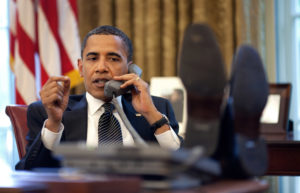
In fact, a recent Times story estimated that American technology companies are losing out on billions of dollars in business contracts overseas because foreign companies don’t want to risk having their customers’ privacy breached by NSA snoopers.
The overhaul, which would need to be approved by Congress, would have the NSA end the collection of data on Americans’ phone-calling habits, with the agency only able to obtain specific records with the permission of a judge. The records would be housed with the phone companies, which would no longer be required to hold onto the data for any specific period of time. Currently the NSA retains the phone data for five years.
The proposal comes in response to a speech President Obama gave in January when he said he had instructed the Justice Department and intelligence officials to come up with a plan to get the NSA out of the business of spying on regular Americans. The deadline for that plan is March 28, when the current court order authorizing the program, section 215 of the Patriot Act, expires.
The suggested changes appear to meet the approval of some of the biggest critics of the NSA program.
Marc Rotenberg, the executive director of the Electronic Privacy Information Center, told the Times the administration’s proposal was a “sensible outcome, given that the 215 program likely exceeded current legal authority and has not proved to be effective.”
Rotenberg said he would like to see more overhauls to other surveillance authorities, but he called the proposal “significant” and said it addressed the major concerns with the NSA’s bulk records program.
“We have many questions about the details, but we agree with the administration that the NSA’s bulk collection of call records should end,” said Jameel Jaffer of the American Civil Liberties Union, who added, “As we’ve argued since the program was disclosed, the government can track suspected terrorists without placing millions of people under permanent surveillance.”
Under the proposal, the government could swiftly seek related records for callers up to two phone calls, or “hops,” removed from the number that has come under suspicion — even if those callers are customers of other companies.
There are already several bills in Congress to change the NSA procedures—ranging from proposals that would authorize the current program with only minor adjustments to proposals to end it.
Congress has been preoccupied with a bill to come out of the House Intelligence Committee that would authorize the program and allow the NSA to issue subpoenas for specific phone records without prior judicial approval. The Obama proposal is stricter, requiring a judge to determine whether the standard of suspicion was met for a particular phone number before the NSA could obtain associated records.


